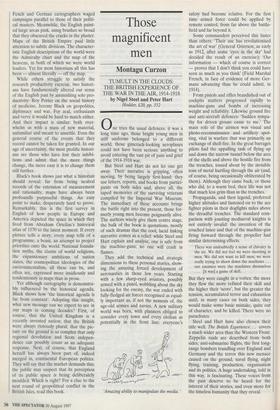Those magnificent men
Montagu Curzon
TUMULT IN THE CLOUDS: THE BRITISH EXPERIENCE OF THE WAR IN THE AIR, 1914-1918 by Nigel Steel and Peter Hart
Hodder, £20, pp. 352 ne tries the usual defences: it was a long time ago, those bright young men in stiff uniforms belonged to a different world, those gimcrack-looking aeroplanes could not have been serious; anything to avoid entering the vast pit of pain and grief of the 1914-1918 war.
But Steel and Hart do not let one get away. Their narrative is gripping, often moving, by being largely first-hand: they use letters, reports, and books from partici- pants on both sides and, above all, the taped memories of the surviving veterans compiled by the Imperial War Museum. The immediacy of these accounts brings the battle right into the present, those for- merly young men become poignantly alive. The authors wisely give them centre stage, the bulk of the book is quotations, mostly of such dramas that the cool, lucid linking narrative comes as a relief: while Steel and Hart explain and analyse, one is safe from the machine-guns; no one will crash in flames.
They add the technical and strategic dimensions to these personal stories, show- ing the amazing forced development of aeronautics in those few years. Starting with a few sharp-eyed aviators, possibly armed with a pistol, wobbling about the sky looking for the enemy, the war ended with fully-fledged air forces recognised as equal- ly important as, if not the nemesis of, the age-old armies and navies. A new military world was born, with planners obliged to consider every town and every civilian as potentially in the front line: everyone's Amazing ability to manipulate the media.' safety had become relative. For the first time armed force could be applied by remote control, from far above the battle- field and far beyond it.
Some commanders perceived this faster than others: 'Their use has revolutionised the art of war' (General Grierson, as early as 1912, after some 'eyes in the sky' had decided the result of an exercise); 'Our information — which of course is correct — proves that I don't think you could have seen as much as you think' (Field Marshal French, in face of evidence of more Ger- mans advancing than he could admit, in 1914).
From pistols and rifles brandished out of cockpits matters progressed rapidly to machine-guns and bombs of increasing weight and reliability. Likewise ground fire and anti-aircraft defences: 'Sudden sympa- thy for driven grouse came to me.' The main role of the airmen was visual and photo-reconnaissance and artillery spot- ting, vital in warfare that was primarily an exchange of shell-fire. In the great barrages pilots had the appalling task of flying up and down the narrow tunnel below the arcs of the shells and above the hostile fire from the trenches, tossed about by the invisible tons of metal hurtling through the air (and, of course, being occasionally obliterated by them). Although they came back, or those who did, to a warm bed, their life was not that much less grim than in the trenches.
Propaganda, and then legend, preferred higher altitudes and fastened on to the ace fighter pilots in their dogfights miles above the dreadful trenches. The standard com- parison with jousting mediaeval knights is not entirely invalid: the invention of the couched lance and that of the machine-gun firing forward through the propeller had similar determining effects.
There was undoubtedly a sense of chivalry in the air. We did not feel we were shooting at men. We did not want to kill men; we were really trying to shoot down the machines . our enemies were the machines themselves . .. [it was] a game of skill.
But they were caught in a vortex: the more they flew the more refined their skill and the higher their 'score', but the greater the tension, accumulated terror and exhaustion until, in many cases on both sides, they would make some basic mistake, quite out of character, and be killed. There were no parachutes.
Steel and Hart have also chosen their title well. The British Experience. . . covers a much wider area than the Western Front. Zeppelin raids are described from both sides, anti-submarine flights, the first long- range bombers trundling over England and Germany and the terror this new menace caused on the ground, naval flying, night flying, training, production, organisation and its politics. A huge undertaking, told in this way, is fascinating. These voices from the past deserve to be heard for the interest of their stories, and even more for the timeless humanity that they reveal.


















































 Previous page
Previous page